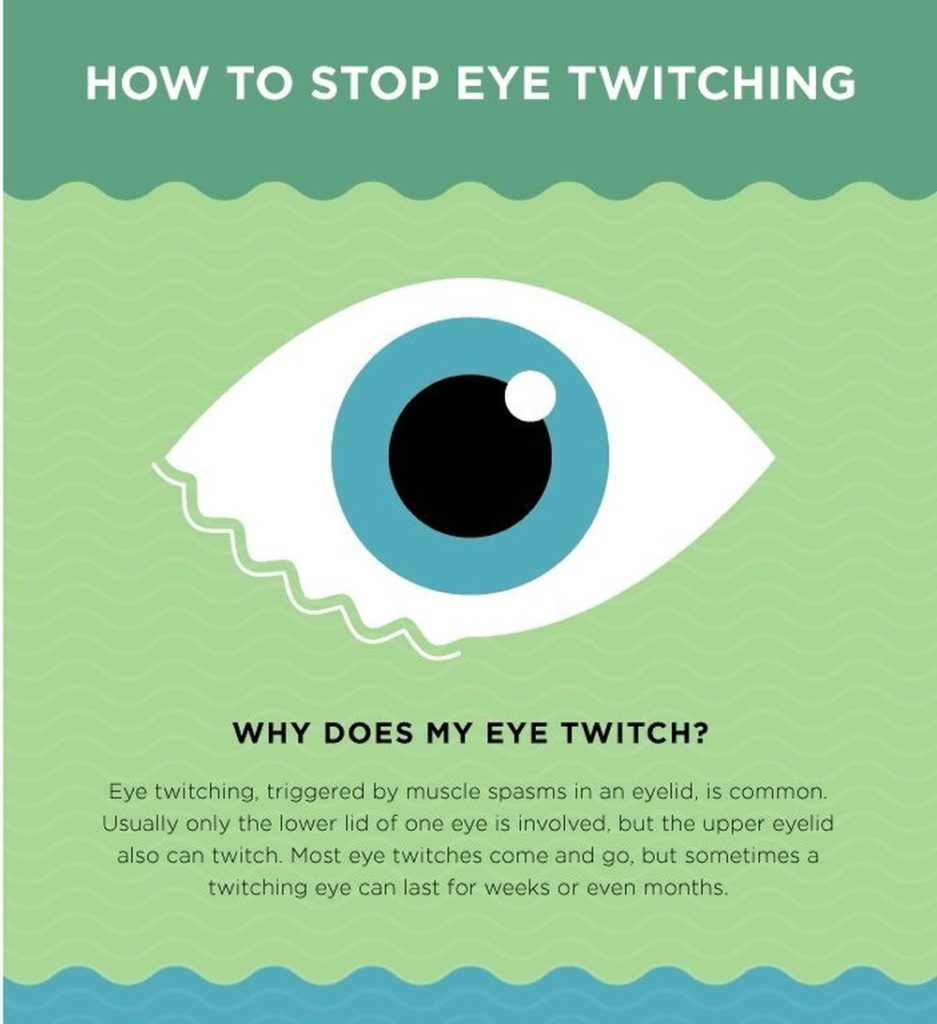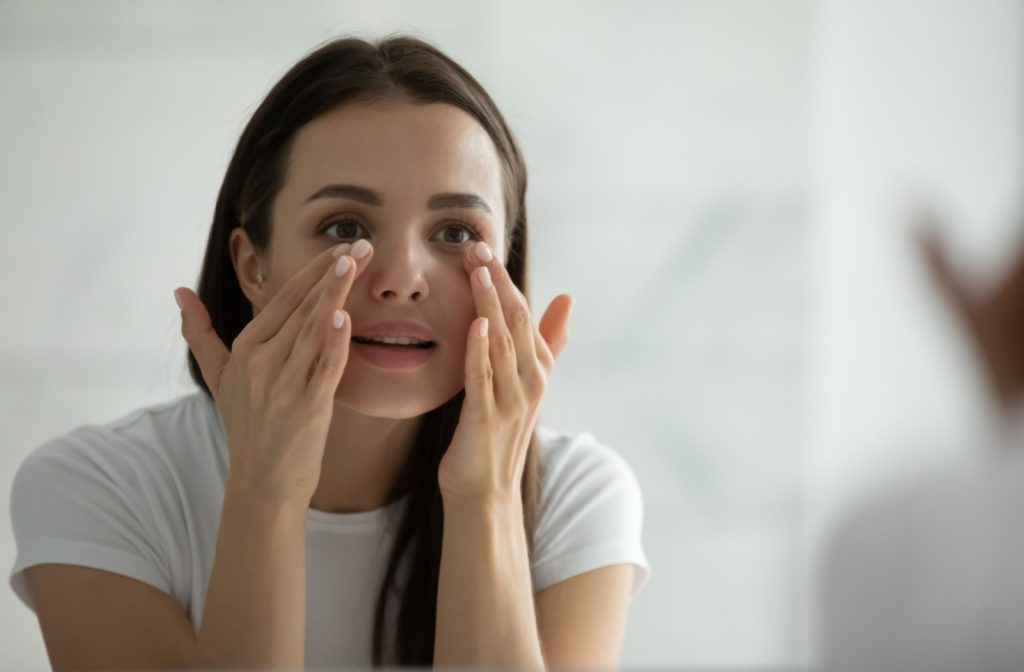An unexpected eye twitch might not seem like a big deal—until it begins to happen repeatedly. Many of us have experienced the sudden and involuntary twitching of an eyelid. Thankfully, there are plenty of common causes of eye twitching, including caffeine, eye strain, allergies, alcohol, and fatigue. These causes can be easily treated by reducing stimulants, hydrating, and resting, all of which can help prevent future eye twitches.
In rare cases, eye twitching can be linked to a serious underlying condition. See an optometrist if you have an eye twitch that doesn’t go away relatively quickly.

Why Is My Eye Twitching?
The medical term for eye twitching is myokymia, which refers to the involuntary and repetitive spasms of the eyelid muscles. These spasms usually occur in the upper eyelid, but they can affect the lower lid as well. This twitching isn’t painful, but can disrupt your day and even make you self-conscious.
Lifestyle habits, temporary stressors, or minor health issues cause most eye twitches. Rest assured: the vast majority of cases are benign.
Can Eye Twitching Be a Symptom of a Serious Condition?
Occasional eye twitching is almost always harmless. However, you should take it seriously if twitching persists, becomes painful, or is accompanied by other symptoms (such as swelling, redness, or eye discharge). Persistent or severe twitching could be linked to underlying conditions such as:
- Blepharitis (eyelid inflammation)
- Dry eye disease
- Facial Palsy (e.g., Bell’s Palsy or hemifacial spasm)
- Neurological disorders like dystonia or multiple sclerosis (though such instances are extremely rare)
If your eye twitching is ongoing or affecting your vision, it’s worth it to consult a doctor in order to rule out any of these conditions.
Types of Eyelid Twitches
There are a few types of eyelid twitches with varying causes and characteristics:
- Benign Essential Blepharospasm: This condition involves involuntary muscle contractions and spasms commonly affecting both eyes. It’s more common in middle-aged or older people and, if severe, can require medical intervention.
- Hemifacial Spasm: Unlike myokymia, this rare condition involves twitching not just in the eyelid but throughout one side of the face.
- Simple Myokymia: This is the most common type of twitch and is usually temporary and triggered by lifestyle or environmental factors.
What Causes Eye Twitching
Several factors can trigger eye twitches. Here are eight key culprits that could help you pinpoint the cause of your discomfort:
1. Stress
Stress is one of the most common causes of eye twitching. Your body reacts to stress in various ways, and a twitching eyelid can be a subtle (albeit annoying) sign that it’s time to take a break or address underlying stressors.
2. Fatigue
Not getting enough rest? Poor sleep weakens your body and nervous system, making twitches more likely.
3. Eye Strain
Spending hours staring at screens? Overworked eyes can easily lead to twitching. Digital eye strain, sometimes called “computer vision syndrome,” is a frequent culprit in today’s tech-heavy world.
4. Caffeine
Your daily cup (or three) of coffee may have side effects. Too much caffeine can overstimulate your nervous system and result in muscle twitches, including in the eyelid.
5. Alcohol
Similar to caffeine, alcohol can overstimulate your nervous system. Regular or excessive drinking may contribute to eye-twitching episodes.
6. Dehydration
Dehydration affects your muscles and nerves, making them more prone to spasms—including pesky eyelid twitches.
7. Allergies
Allergic reactions can cause dry eyes, itching, and irritation—leading to eyelid twitching. Rubbing your eyes due to allergies may only make the problem worse.
8. Nutritional Deficiency
Deficiencies in nutrients like magnesium, potassium, and specific B vitamins may trigger muscle spasms, including in the eyelids.
Possible Eyelid Twitch Complications
While myokymia itself is typically harmless, untreated underlying causes of eyelid twitching, such as chronic eye strain or allergic reactions, can lead to complications, including:
- Chronic dry eyes
- Persistent discomfort
- Difficulty focusing or completing daily tasks
If complications arise, addressing the root cause can help resolve the issue.
Eyelid Twitch Treatment
Treating eyelid twitches often means focusing on the factors causing them. Thankfully, many of these issues can be resolved through simple adjustments or treatments such as:
- Relaxation: Managing stress through meditation, yoga, or relaxation techniques can help calm muscle twitches.
- Adjust Screen Time: Follow the “20-20-20 rule”—take a 20-second break every 20 minutes to look at something 20 feet away.
- Cut Back on Stimulants: Reducing caffeine or alcohol intake can have noticeable results.
- Hydration: Staying well-hydrated can reduce the frequency of muscle spasms.
- Eye Drops: Lubricating eye drops or antihistamine drops can treat dry or irritated eyes caused by allergies.
If these approaches don’t work, a doctor might recommend prescription treatments or additional investigations to rule out neurological causes.
How to Stop Eye Twitching

If eye twitching has been bothering you, try these simple strategies for immediate relief:
- Gently massage the affected eyelid in small circles.
- Apply a warm compress to relax the muscles.
- Blink consciously and slowly—this can often relax the muscle responsible for the twitching.
Preventing Eyelid Twitches
While occasional twitches are hard to avoid, implementing these preventative measures can reduce your chances of dealing with them:
- Get 7–9 hours of quality sleep per night.
- Maintain a balanced diet rich in vitamins and minerals.
- Use proper lighting and maintain a safe distance from screens to avoid strain.
- Stay hydrated and avoid excessive caffeine or alcohol consumption.
When to Ask a Doctor About Eye Twitching
Most eye twitches will stop on their own after a few hours or days. However, you should consult a doctor if:
- The twitching doesn’t resolve within a week.
- You experience additional symptoms like swelling, drooping eyelids, or vision changes.
- The twitching involves other areas of your face.
A professional evaluation can ensure that nothing more concerning is at play. In most cases, treatment will provide effective relief. Dr. Shonah Finlay Doctors Eye Care advocates for a holistic approach to eye health. Small lifestyle changes (like cutting down on coffee, getting more sleep, or managing stress) can greatly support eye health. Contact us today if you have a persistent eye twitch to find relief.




